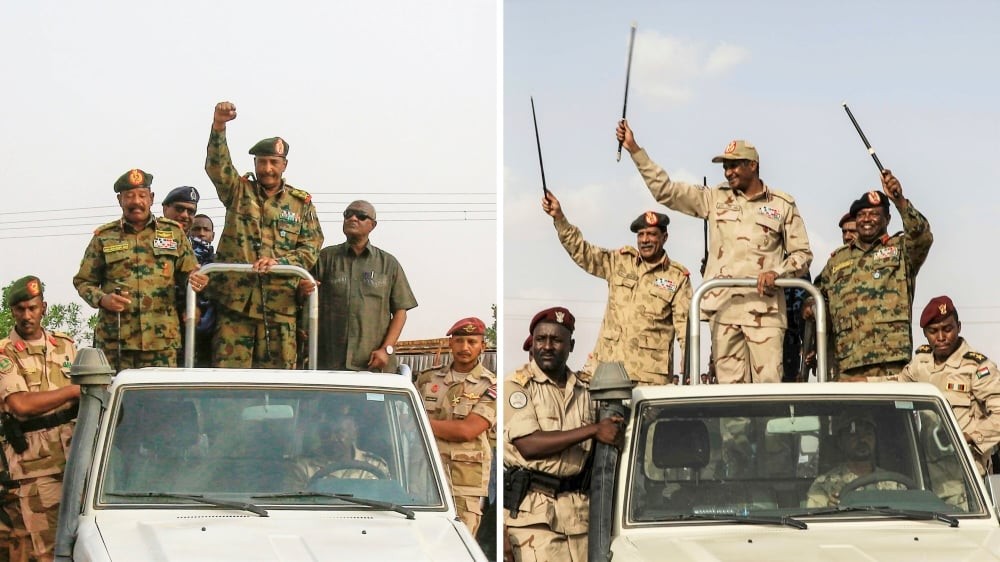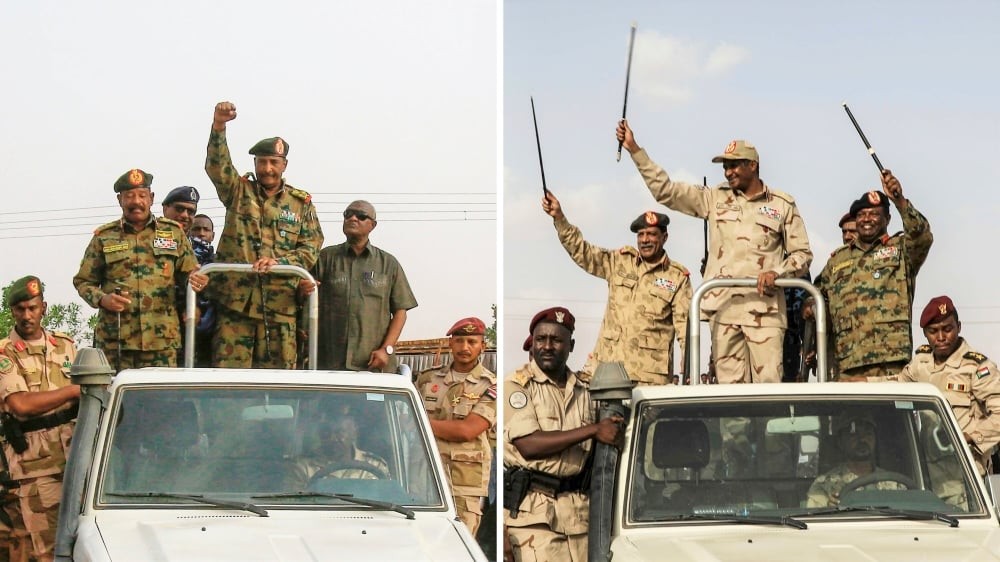The Sudan's war: Another Genocide in view!!??
- 25 Avr, 2023
- 3608 vues
The war in Sudan between the army and paramilitary groups headed by two generals, Abdel Fattah al-Burhan and his deputy Mohamed Hamdani Dagalo ‘Hemedti’ has exposed a conflict of interest from various international partners of Sudan.
When the war broke out few days ago, the obvious cause was seen as their constant power struggle and the blocking of Hemedti from putting his paramilitary Rapid Support Forces (RSF) under the command of the Sudan Armed Forces headed by al-Burhan.
In the wake of the imbroglio, the AU called for an emergency meeting to discuss the situation which saw all of Sudan’s neighbours and partners in the Horn and Middle East showing up.
Report has it that aside IGAD, the permanent members of the United Nations Security Council which includes the UK, US, China, Russia and France, Africa’s representatives in the Security Council Gabon, Mozambique, Ghana, Arab League and the UN officials, Qatar, the UAEand Saudi Arabia also sent representatives. And so did Egypt, Libya, South Sudan, Kenya, Ethiopia, Chad and Central Africa Republic.
They claimed to have requested the belligerents to designate interlocutors to work with the Mechanism, to monitor and verify the humanitarian ceasefire, and to further elaborate permanent ceasefire arrangements including the withdrawal of forces from urban areas.

However by April 23, 2023, it was noted that the Sudanese army soldiers loyal to army chief Abdel Fattah al-Burhan had manned a position in the Red Sea city of Port Sudan.
On Friday, the two warring sides signalled a ceasefire, to last through Id El -Fitr celebrations. But the power struggle was still rife. Al-Burhan issued a decree removing the Border Guards under the RSF to be under the control of the Armed Forces. Whether that weakens the RSF, initially formed to patrol borders and provide security in remote parts of the country, is yet to be seen.
The struggle, however, may or may not benefit either or other countries but is an obvious opportunity for countries to elevate their image, by rushing to mediate. So far, Kenya, Turkey and Egypt have offered to mediate.
Kenya President William Ruto said on Friday “Kenya hereby offers to host a process of mediation between the parties to the Agreement.”
“We make this offer in the spirit of brotherhood, peace and solidarity as an acceptable neutral venue and also as an engaged stakeholder well-seized with the challenges facing our region. Kenya has a strong track record in effectively facilitating peace-making and settlement of political conflict,” he said.
Turkish Mevlut Cavusoglu was quoted by Xinhua as saying: “We are negotiating with both parties. We are negotiating to stop the conflict. We are on the field with our friends. We are currently meeting with the vice president. We are also meeting with the commander of the Rapid Support Forces to stop the war.”
Egypt, whose troops had been ensnared in the fighting, managed to rescue them in three planeloads. But Cairo had to use the UAE as interlocutors to rescue the soldiers who had been stationed in Meroe under a bilateral military agreement signed during the Omar al-Bashir days. They had been detained by the RSF, who accused Cairo of taking sides, a charge the Egyptian presidency denied. In the end, the RSF said they had freed the soldiers and thanked “the brotherly Egyptian government and its people” for supporting Sudan.
Each of the other countries in the peace bid have promised to rescue their nationals stuck in Khartoum should the situation demand it. But there are other interests, some conflicting.
Dr Rashid Abdi, a senior researcher and analyst on the Horn of Africa and the Gulf, was quoted to have said that Saudi Arabia, UAE and US are so far the only players with real leverage to end conflict in Sudan, having been involved in its recent political games and bearing influence on the two warring parties.
He posits that the prospects for consensus between the 3 on way forward in Sudan modest but not impossible. It however remains their promptness in doing the needful to avert irreversible loss of lives and properties.
Nisrin Elamin, a Sudan assistant professor of Anthropology at the University of Toronto, also noted that Emiratis and Saudis have spent a combined $27 billion on Sudanese land, real estate and infrastructure projects “during the latter part of the Al-Bashir regime. “(They) were the first to bankroll the coup regime, even if they play different roles now.
“I think it’s hugely damaging to claim that this is an externally orchestrated war… but we should be tracing how these factions accumulated the resources that have partly funded this violence,” she said, referring to claims Russia and the private military Wagner Group was fuelling the violence.
In the midst of the raging, multiple evacuation operations by foreign citizens or embassy staff has been spurred with focus on road, air and sea.
However, the main airport in the capital Khartoum has been the site of heavy fighting and is under the control of the paramilitary Rapid Support Forces (RSF) that is fighting the army limiting the air access which leaves evacuations from Port Sudan on the Red Sea, a more favourable option. Some countries has also raised the fear of possible attack on road evacuation should it be considered an option.
Here is an overview of what various nations have done in efforts to take stranded citizens to safety.
Saudi Arabia led the first reported successful evacuations on Saturday, 23 April, with naval operations picking up more than 150 people including foreign diplomats and officials.
Riyadh announced the “safe arrival” of 91 Saudi citizens and around 66 nationals from 12 other countries which includes Kuwait, Qatar, the United Arab Emirates, Egypt, Tunisia, Pakistan, India, Bulgaria, Bangladesh, the Philippines, Canada and Burkina Faso.
United States and Canada
On Sunday, the US military sent three Chinook helicopters to evacuate American embassy staff from Khartoum.
Media recorded that more than 100 US forces took part in the rescue to extract fewer than 100 people, which saw the choppers flying from Djibouti to Khartoum, where they stayed on the ground for less than an hour.
US officials have also warned that any wider effort to evacuate American citizens is unlikely in the coming days.
Canada has also pulled its embassy team out, Prime Minister Justin Trudeau said.
The British army has evacuated UK embassy staff and their families in a “complex and rapid” operation, Prime Minister Rishi Sunak said but however noted that some British citizens are still trapped in Sudan and have been calling on social media for help.
The Norwegian ambassador said he other Norwegian diplomats had also been evacuated.
The Swiss foreign ministry said seven embassy staff and five others were evacuated with the help of other countries.
European Union foreign policy chief Josep Borrell also said on Monday that 1,000 EU citizens had been evacuated.
"Two French planes landed in Djibouti on Sunday with a total of 200 people of multiple nationalities. On board were 25 Swedish citizens", Prime Minister Ulf Kristersson Said, including foreign ministry staff and aid workers.
The Netherlands’ Foreign Minister Wopke Hoekstra said a “handful” of Dutch people had been evacuated on a French aircraft, with another group leaving Khartoum by road in a UN convoy.
Italy evacuated around 200 people in a military operation on Sunday, 23, April including all Italian citizens who “had asked to leave” and other nationalities, including representatives of the Vatican.
The Greek foreign ministry said a first group of evacuees departed “with the assistance of France” on Sunday, and a further 10 nationals and their families departed in the Italian operation.
Berlin said it had airlifted 300 people using three planes including Germans and other nationalities following an aborted attempt on Wednesday.
A Spanish military plane with 100 passengers -- 30 Spanish and 70 other nationalities also left on Sunday April, 23, for Djibouti, Madrid said.
The Irish government is deploying 12 defence personnel to Djibouti to help evacuate 150 citizens in Sudan.
Turkey
began operations at dawn on Sunday, taking some of its estimated 600 nationals by road from two Khartoum districts and the southern city of Wad Madani.
But plans were postponed from one site in Khartoum after “explosions” near a mosque designated as the assembly area, the embassy said.
Arab nations
Egypt’s military last week evacuated 177 of its soldiers from Sudan. On Sunday the foreign ministry said 436 citizens had left by land. Over 10,000 Egyptians are thought to live in Sudan.
Jordan on Saturday, April 22, said it had begun the evacuation of some 300 Jordanian citizens, adding it engaged in “continuous cooperation with the UAE and Saudi Arabia”.
Iraqi embassy staff left Khartoum on Saturday, foreign ministry spokesman Ahmed al-Sahhaf said, while on Sunday, 14 citizens arrived in Port Sudan.
Lebanon said 52 citizens who had travelled by road from Khartoum to Port Sudan had boarded a Saudi naval vessel on Monday.
Libya said Monday, April 24, that 105 citizens would be flown home from Jeddah after being evacuated by the Saudi navy.
The Tunisian embassy has also announced an evacuation operation planned for Monday, April 24, with some citizens having already left aboard Saudi ships.
The Philippines said by Monday it would begin evacuating nearly 700 Filipinos “within the next 24 hours”, having contracted buses heading to Egypt.
Japan and South Korea have deployed forces to nearby countries and are preparing for evacuations, while Japanese media is reporting some nationals were onboard the French aircraft.
India’s foreign ministry said two air force planes are “on standby” in Saudi Arabia and a naval ship has arrived in Port Sudan.
The Sudanese army has said it is also coordinating efforts to evacuate diplomats from China.
Indonesia said 43 citizens were sheltering inside the embassy compound in Khartoum.
Even as countries has risen to the occasion to secure the lives of their citizens, Nigeria is yet to come up with its own plans and strategies as students who attempted to flee into Ethiopia were denied access at the border. As the growing list of nations rush to get citizens and diplomats to safety, Nigeria is still counting its challenges.
- Catégorie:
- Politique
- Pas de commentaires



